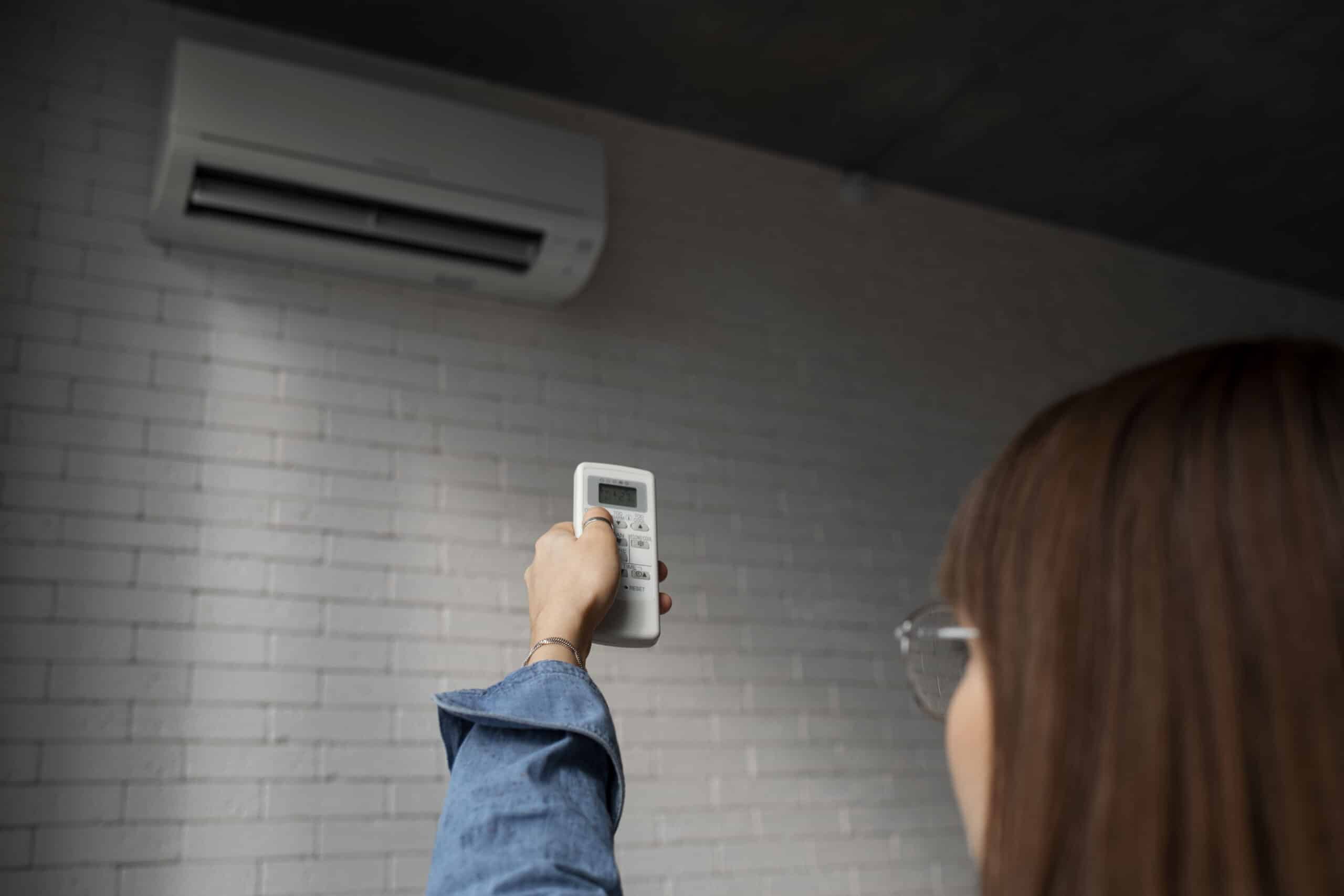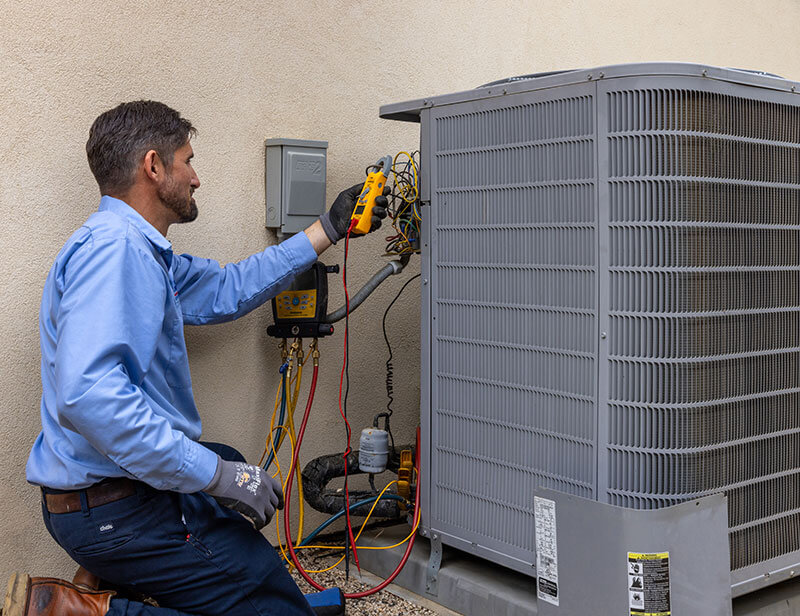Trustworthy Team at DMAKS HVAC for All Your HVAC Needs.
Wiki Article
Exactly How to Select the Right A/c System for Your Requirements
Choosing the proper heating and cooling system is an important choice that needs careful consideration of numerous aspects. Begin by assessing your home's size, format, and special demands, as these elements determine the required ability and configuration of the system. In addition, establishing a spending plan that encompasses setup and lasting operational prices is important. As you evaluate your options, recognizing energy performance scores and the implications of your neighborhood climate will certainly play a considerable duty in your option. However, the myriad of system kinds available can complicate this procedure, leading one to wonder which course ultimately brings about optimal convenience and efficiency.Evaluate Your Home Dimension
Evaluating your home size is an important initial action in picking the ideal HVAC system. A Heating and cooling system that is also tiny will certainly struggle to maintain comfortable temperatures, leading to enhanced energy usage and wear on the device.
To properly evaluate your home dimension, measure the square footage of each room, thinking about factors such as ceiling height and the design. In addition, consider the insulation top quality and the number of home windows, as these components influence thermal efficiency. Residences with open layout might require different system arrangements contrasted to those with numerous divided spaces.
Making Use Of the Manual J load calculation approach can offer a more specific quote of your a/c needs. This approach represent different elements, including regional climate, solar gain, and tenancy patterns. By thoroughly assessing these facets, you can make sure that your chosen a/c system is properly sized, leading to improved comfort, energy performance, and durability of the tools.
Determine Your Budget Plan
Determining your budget plan is a pivotal action in the HVAC system option process, as it establishes the specifications for your alternatives - DMAKS HVAC. A cooling and heating system is a considerable investment, and recognizing your monetary restrictions will aid limit selections that fit within your waysBegin by assessing not only the first acquisition cost yet likewise installment expenses, which can differ considerably relying on the complexity of the task. Consider continuous costs such as upkeep, repairs, and energy consumption. A system might show up affordable at first however can bring about higher costs gradually if it is much less reliable.
It is advisable to designate a backup fund for unexpected costs that may develop throughout installation or initial system changes (DMAKS HVAC). Additionally, check out funding alternatives or discounts that may be offered, as these can alleviate the burden of in advance expenses
Inevitably, having a clear budget plan enables you to engage with a/c experts a lot more effectively, ensuring you receive tailored recommendations that aligns with your economic objectives and home requirements. By being persistent about your spending plan, you can make enlightened decisions that boost comfort without jeopardizing financial security.
Evaluate Power Effectiveness
Power efficiency plays an essential function in the total performance and cost-effectiveness of your cooling and heating system. When selecting a system, it is necessary to consider its energy performance ratings, as these numbers directly affect your energy bills and ecological footprint. Try to find systems with a high Seasonal Power Effectiveness Ratio (SEER) for cooling down and a high Annual Gas Utilization Effectiveness (AFUE) ranking for heating. Greater scores indicate higher efficiency, meaning even more comfort for much less power intake.Furthermore, think about the Power Celebrity qualification, which go to this website signifies that the system satisfies rigid effectiveness standards established by the Epa. Buying an Energy Star-rated heating and cooling system can cause substantial financial savings over time, particularly in areas with extreme temperature fluctuations.
One more aspect to review is the system's dimension and capacity. An oversized or undersized system can lead to ineffectiveness and increased power prices. DMAKS HVAC. Correct sizing, usually figured out via a Hand-operated J tons calculation, makes sure that the system operates at optimal efficiency


Consider Environment and Environment
When choosing an a/c system, it is essential to consider the regional environment and environmental conditions, as these variables considerably influence the system's efficiency and efficiency. Different regions experience varying temperature extremes, humidity levels, and seasonal modifications, every one of which influence home heating and cooling demands.
Moreover, regional ecological elements, such as air top quality and potential allergens, need to inform your option. Equipments geared up with innovative filtration innovations can aid mitigate toxins and provide cleaner air. Furthermore, take into consideration the energy sources offered in your location-- some a/c systems are extra efficient when powered by gas or eco-friendly power sources.
Eventually, straightening your cooling and heating system selection with your regional environment and ecological factors to consider will lead to improved convenience, boosted performance, and reduced power prices.
Explore System Types and Features
As house owners look for to see this website optimize comfort and efficiency, checking out the different sorts of a/c systems and their one-of-a-kind attributes becomes vital. The key kinds of cooling and heating systems consist of air conditioning, warmth pumps, ductless mini-split systems, and heaters. Each system offers distinct advantages tailored to different needs and preferences.Central air conditioning systems provide uniform cooling throughout a home, making them perfect for larger spaces. Heatpump serve as both heating and cooling options, using power to transfer heat, which can result in lower energy expenses. Ductless mini-split systems are becoming significantly preferred due to their versatility and ease of installation, permitting property owners to manage the visit this site temperature in specific spaces without substantial ductwork.

Conclusion
Finally, picking the appropriate HVAC system necessitates careful consideration of numerous elements, consisting of home dimension, budget constraints, power performance, local environment, and available system types. A thorough assessment of these elements ensures optimal comfort and cost-effectiveness. By following a structured approach, homeowners can make informed choices that straighten with their details demands and choices, eventually causing improved indoor air quality and power financial savings.Report this wiki page